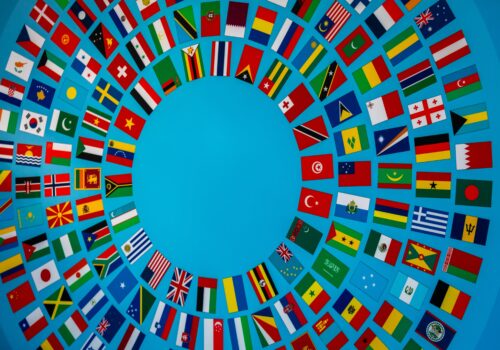The IMF needs to find its geopolitical bearing
Finance ministers and central bank governors are preparing to meet later this month for the International Monetary Fund (IMF) and World Bank’s Annual Meetings. The geopolitical background is becoming ever more difficult, and political developments and impending elections in the United States and other large member countries have cast uncertainty over the proceedings. Nevertheless, Western delegates should think hard about how the financial and intellectual capital invested in the Bretton Woods institutions can be put to better use in the interests of democracies around the world.
Among the two institutions, the World Bank is the more straightforward case. After last year’s leadership change, the Bank is back to the business it does best—supporting global development as well as fighting the effects of climate change and preparing for future pandemics, among other tasks. The issue here is providing the Bank with the financial means to conduct its operations, as well as ensuring efficient project selection and execution. The tasks may have become more complex, but the fundamental business of the Bank has not changed, nor have the interests of its shareholders.
With the IMF, the issues are more complicated. The institution saw a major shift of its activities into climate and development lending in recent years, partly in response to the COVID-19 pandemic and partly because major shareholders got impatient with the slow embrace of climate initiatives by the previous World Bank president. The IMF embarked on several rounds of fundraising to increase its basic capital (or quotas) and build up trust funds to provide for subsidized loans to lower-income members. These efforts are now running into budget constraints in richer countries, but a decision to reduce interest rate surcharges for certain borrowers is still expected to take place prior to this month’s meetings.
Lending needs better results
As a result of these changes, the IMF is now engaged on a large number of relatively small programs with developing countries, many of which are mired in (Chinese-held) debt and have difficulties making ends meet. In principle, the IMF should insist on more thorough debt restructurings before concluding programs with the latter group, a condition that often remains unfulfilled because creditors are either unwilling or exceedingly slow to act. Still, as the supposed “lender of last resort,” the IMF is under pressure from well-meaning shareholders (who are also competing with China’s Belt and Road Initiative) to proceed, storing up financial trouble for its borrowers and itself down the road.
Larger countries have by and large eschewed IMF lending in recent years. The exceptions are countries such as Argentina, Egypt, and Pakistan that would have difficulties borrowing money from financial markets at reasonable rates. These countries are among the most frequent IMF customers in recent history and are known to quickly forget the promises made at the time their lending programs were concluded. Yet, they tend to regain access to IMF programs because of their geopolitical relevance or other considerations relevant to key IMF shareholders. Their preferential treatment carries financial risks and serves as a major disincentive for other countries to fulfill their program obligations.
The IMF’s leadership has a key role to play in this regard. The IMF’s statutes have endowed its managing director and staff with considerable independence. It is their role to negotiate programs and assess the conditions under which disbursements can move to the board for approval. They should use that prerogative to design programs that leave countries and their populations better off over the medium to long term, rather than burying them under highly senior multilateral debt that will have to be repaid before claims by other creditors. The message sent by IMF management to shareholders should be: “Let us negotiate sensible program conditions and help us by providing recipient governments with additional incentives, financial or otherwise, to fulfill their obligations.” Anything else might be convenient in the short term but detrimental to the long-term standing of the IMF, which is still a major geopolitical asset of the West.
Unfortunately, the signs go in the opposite direction. For example, the recent news that Rodrigo Valdés, the director of the IMF’s Western Hemisphere department, had to recuse himself from the IMF’s negotiations with Argentina runs diametrically opposed to this principle. His withdrawal follows weeks of pressure from Argentina’s President Javier Milei, who said that he could not work with Valdés because of his policies as Chile’s finance minister.
This is where larger shareholders should get worried. If Valdés was the one to caution about Argentina’s unbalanced policies and failure to adjust the peso to market conditions, then he should have enjoyed the full backing of his management. The United States and other Group of Seven (G7) countries, as the main creditors of the IMF, have the most to lose if the institution continues to extend loans that put its own balance sheet at risk.
Policy messages need sharpening
Another concern relates to the IMF’s role in economic surveillance, which has moved to the background in recent years. The semi-annual World Economic Outlook (along with seven other reports in its orbit) still attracts interest, and the IMF also publishes regular country reports as well as select pieces, for example, on geopolitical fragmentation. These papers reveal the technical expertise of staff, but its policy conclusions often disappoint, mindful of the interests of board directors whose job security partly rests on shielding their home authorities from divergent policy recommendations out of Washington, DC.
A case in point is a recent blog post by several IMF department heads that appeared to downplay the importance of Chinese subsidies for global trade tensions. The article laid out well-reasoned arguments against broad-based tariff and other trade remedies to be applied against China, based on the (correct) insight that growing global current account imbalances are primarily the result of domestic developments in the two largest global economies, including large fiscal deficits in the United States and Europe and weak demand growth in China.
Where the blog post got it wrong, however, was in downplaying the structural and geopolitical impact that Chinese subsidies and trade practices have in the current global environment, a point just emphasized by US Treasury Under Secretary for International Affairs Jay Shambaugh at the Atlantic Council Transatlantic Forum. With its current trade policies, China pursues interests that go well beyond the traditional economic mainstay, including to achieve economic dominance in certain sectors that China holds of strategic importance. The effects of this policy will only become evident over time, most likely during a further intensification of geopolitical tensions when it would be too late for the West to react. One would have wished the IMF to take a clearer line on these policies, as would behoove an institution that counts mostly democracies among its largest members.
The lack of a deft geopolitical posture also revealed itself in an own goal that the IMF shot by announcing (and then canceling) a visit to Moscow for the 2024 Article IV Consultation, a regular surveillance exercise that all IMF members are required to undergo. Given the increasing lack of economic statistics published by Russia, the visit could have been an excellent opportunity to assess the true state of its economy, as well as identifying any Potemkin constructs in the country’s national accounts. Unfortunately, the IMF seems to have been swayed by member countries that focused on the perceived political significance of the visit, with some even accusing the institution of contributing to the Russian war effort. The IMF could have easily made the opposite case, showcasing its much-needed financial support for Ukraine. Instead, through unfortunate timing and bad communications, it missed a serious opportunity to demonstrate its value and explain its mission to the wider public.
Use it responsibly
The IMF’s main shareholders should use the Annual Meetings to lean on the IMF to refocus its resources on where they could be most useful at this time—freeing up its excellent staff to analyze economic trends and develop useful policy solutions in an environment of geopolitical rivalry. The IMF is neither a climate nor a development institution, nor is it a fund for geopolitically convenient bailouts. It is dedicated to enabling open trade and maintaining global financial stability, as laid down in its Articles of Agreement eighty years ago. Democratic countries around the world need its work, and its independent voice, more than ever.
Martin Mühleisen is a nonresident senior fellow at the Atlantic Council’s GeoEconomics Center and a former IMF official with decades-long experience in economic crisis management and financial diplomacy.

At the intersection of economics, finance, and foreign policy, the GeoEconomics Center is a translation hub with the goal of helping shape a better global economic future.
Further reading
Fri, Sep 27, 2024
The IMF-World Bank Annual Meetings in 2024: Five important issues to be addressed
Econographics By Hung Tran
Despite intense geopolitical contention that has stymied international cooperation, the October gathering could nevertheless lead to agreements to stabilize a volatile global economy.
Thu, Jul 18, 2024
The Bretton Woods institutions need revitalizing. Luckily, they are no strangers to reform.
Econographics By Amin Mohseni-Cheraghlou
The changing nature of the global economy is forcing these institutions to take a renewed look at their governance structure and mandates. This is not the first time they have had to do so.
Mon, Apr 29, 2024
The IMF warms to industrial policy—but with caveats
Econographics By
Industrial policy is making a comeback around the world. There’s no better sign of this than the new attention paid to subsidies by bastions of the Washington consensus like the International Monetary Fund (IMF), which has historically been very skeptical of them.


